On 28th September, the IURC-China cooperation webinar on Education, Jobs, and Skills invited European and Chinese cities and regions in a collaborative and participatory environment to share best practices for achieving competitiveness and innovation, by enabling citizens through quality and inclusive education, training and lifelong learning to participate fully in society and manage successfully in the labour market transition. The webinar focused on cooperation opportunities in research & development, vocational education & training, and entrepreneurship & innovation.
Opening Session
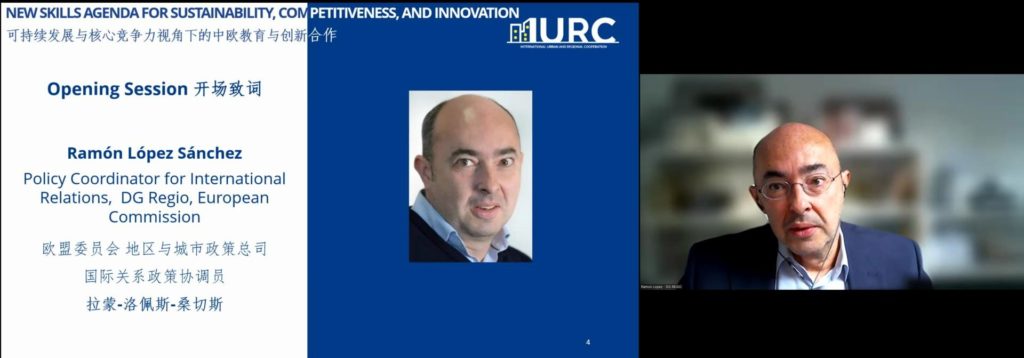
“European Union is experiencing fundamental changes to digital transformation on the one hand, and to the green and carbon-neutral economy on the other. It changes a lot the way we work and the way we learn. Europe and China have a lot of knowledge and experience to offer each other. DG Region wishes this event will have a substantial result and lead to stronger ties between the participating cities and regions and will facilitate further joint actions in the future.”
Ramón López Sánchez, Policy Coordinator for International Relations, from DG Regio of European Commission.
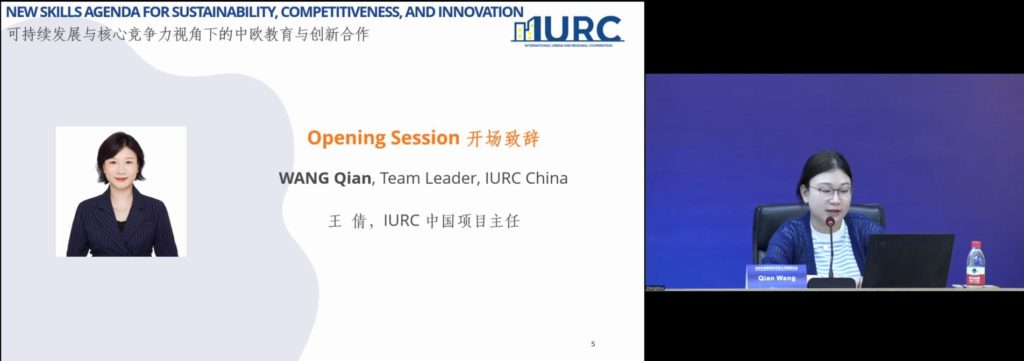
“IURC cities and regions will be working in thematic groups to share their best practices, explore opportunities to cooperate and contribute to the delivery of the New Urban Agenda and Sustainable Development Goals. IURC China project team will facilitate exchange and discussion between cities and regions despite the current challenges of international travelling, and try our best to connect you with potential partners. We hope today the panellists from the government, universities, vocational training schools and research centres will find inspiring ideas and potential for further cooperation. ”
Qian WANG, team leader of IURC China.
Scene Setting
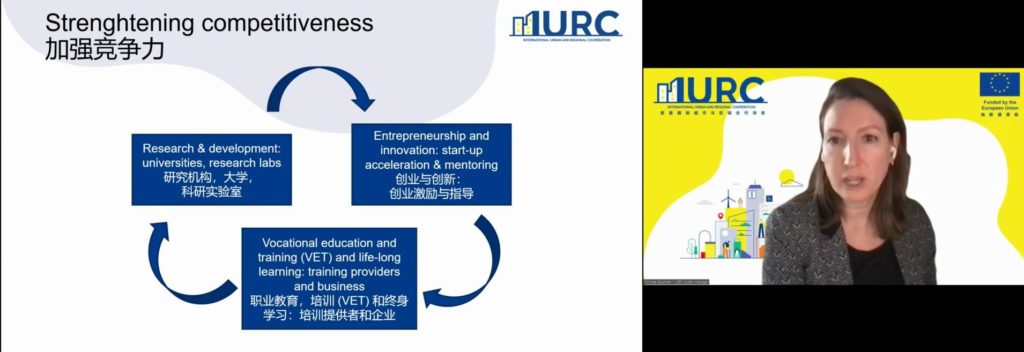 Floriske Deutman, the IURC cluster manager to Education, Jobs & Skills introduced the policy and practices on Skills Agenda in the EU and China, highlighting vocational education and training. She exemplified the experience of EU-China triple helix educational cooperation and provided suggestions on success factors of cross-border cooperation.
Floriske Deutman, the IURC cluster manager to Education, Jobs & Skills introduced the policy and practices on Skills Agenda in the EU and China, highlighting vocational education and training. She exemplified the experience of EU-China triple helix educational cooperation and provided suggestions on success factors of cross-border cooperation.
Panel Presentations
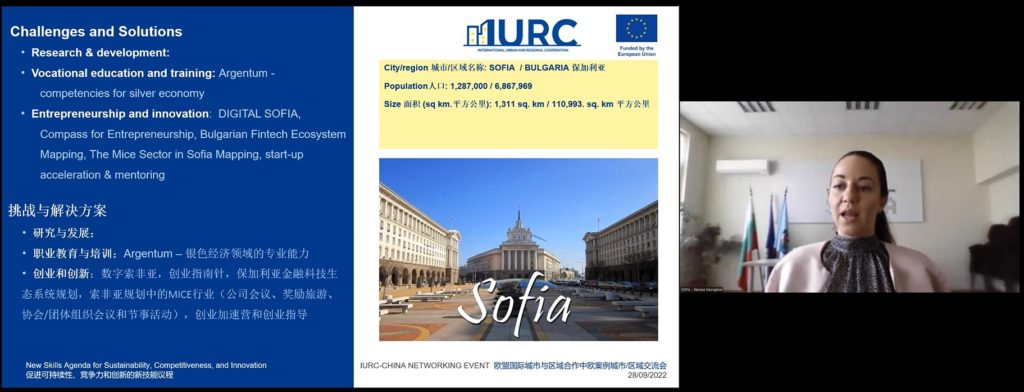
Sofia (Bulgaria) shared pertinent data about the city and strategies for vocational education and innovation. She underlined some successful pilot projects focusing on improving the quality of life for citizens via digitalization and innovations and supporting entrepreneurship for SMEs through financial incentives and capacity building.
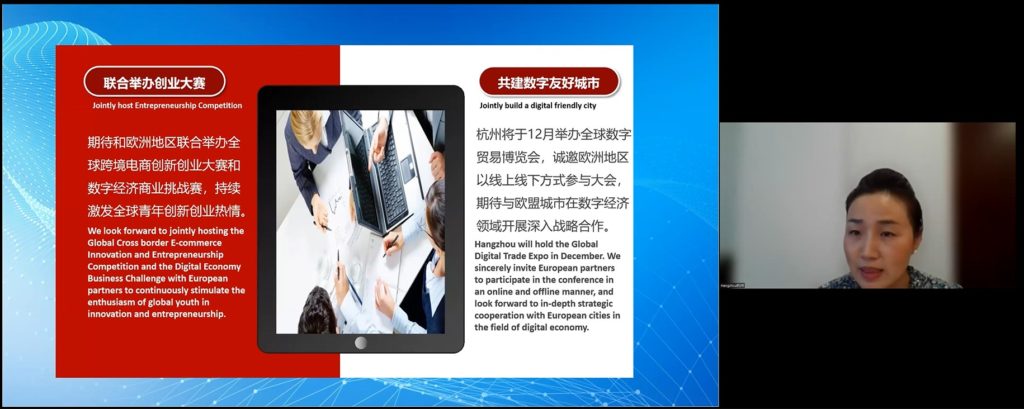 Hangzhou (China) shared the strategy to cultivate e-commerce in higher education and talent pool. Through approaches of “learning by doing”, training all-around talents, and supporting entrepreneurship in colleges, Hangzhou achieved leapfrog e-commerce education and enhanced EU-China cross-border cooperation.
Hangzhou (China) shared the strategy to cultivate e-commerce in higher education and talent pool. Through approaches of “learning by doing”, training all-around talents, and supporting entrepreneurship in colleges, Hangzhou achieved leapfrog e-commerce education and enhanced EU-China cross-border cooperation.
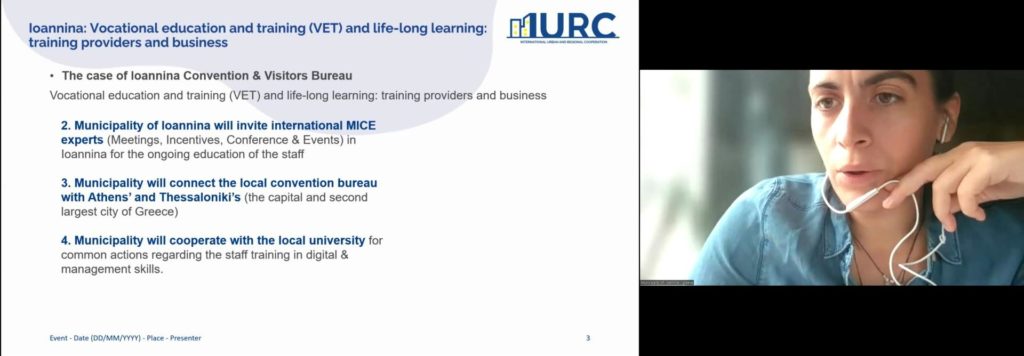 Ioannina (Greece) shared the approaches to develop the capacity of the newly established Convention&Visitors bureau of Ioannina.
Ioannina (Greece) shared the approaches to develop the capacity of the newly established Convention&Visitors bureau of Ioannina.
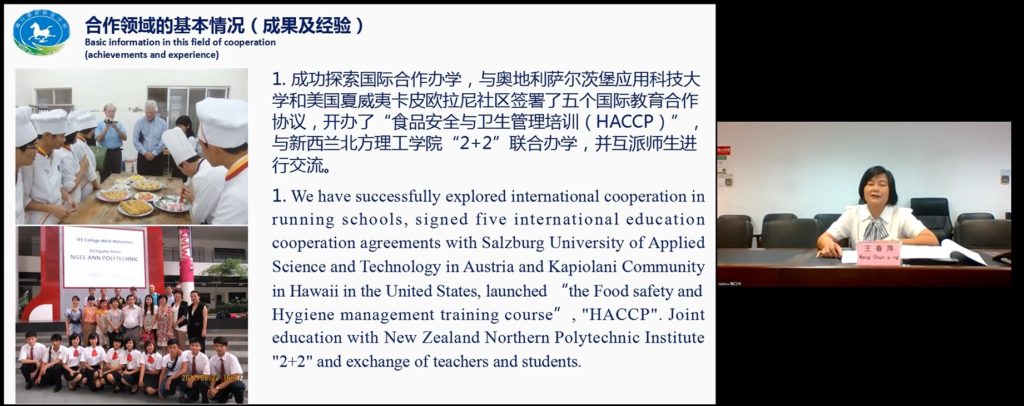 Haikou (China) provided an overview of Haikou Vocational Tourism School underlining the successful inter-regional and international cooperations. The school is actively seeking cooperation in hospitality & culinary, smart tourism information service, early education & health care etc.
Haikou (China) provided an overview of Haikou Vocational Tourism School underlining the successful inter-regional and international cooperations. The school is actively seeking cooperation in hospitality & culinary, smart tourism information service, early education & health care etc.
 Nuovo Circondario Imolese (NCI)-Bologna (Italy) introduced the successful cooperation with Yangzhou city for a joint Green-Design Research Centre, and further shared the city´s innovative solutions for connecting nature and the city, with technological support and cultural awareness.
Nuovo Circondario Imolese (NCI)-Bologna (Italy) introduced the successful cooperation with Yangzhou city for a joint Green-Design Research Centre, and further shared the city´s innovative solutions for connecting nature and the city, with technological support and cultural awareness.
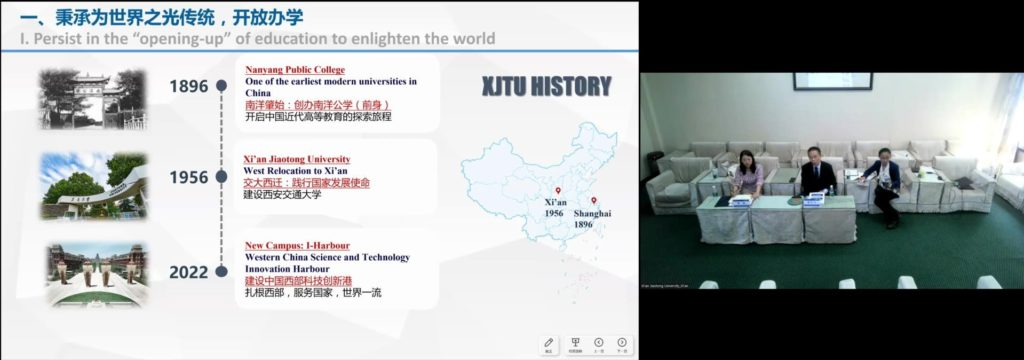 Xi’an (China) introduced their rich scientific and technological resources and cooperation potentials in both higher education and vocational training, aiming to facilitate the development of industrial4.0 and technology hub in western China.
Xi’an (China) introduced their rich scientific and technological resources and cooperation potentials in both higher education and vocational training, aiming to facilitate the development of industrial4.0 and technology hub in western China.
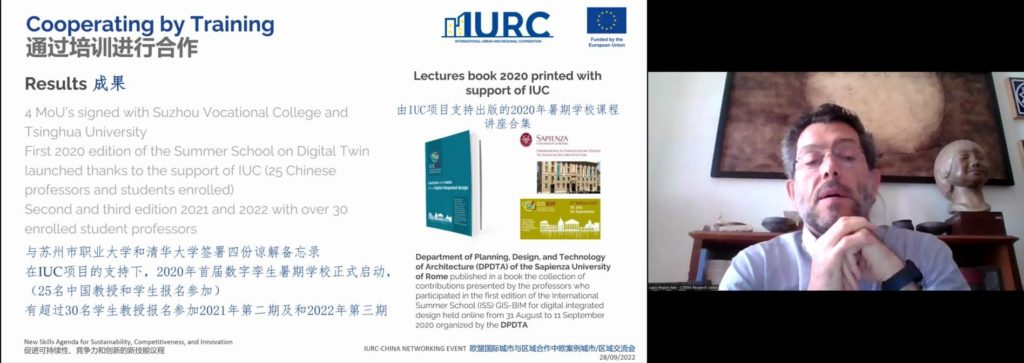 Lazio region (Italy) presented the cutting-edge education, research and innovation environment of the Sapienza University of Rome, highlighting the vision, organisation, and research & training topics of the Interdepartmental Research Centre for Territory, Building, Heritage and Environment (CITERA). The university proposed to cooperate in the fields of energy transition, environmental rural GIS-based analysis, digital twin tools for construction and heritage architecture innovation solutions and design training.
Lazio region (Italy) presented the cutting-edge education, research and innovation environment of the Sapienza University of Rome, highlighting the vision, organisation, and research & training topics of the Interdepartmental Research Centre for Territory, Building, Heritage and Environment (CITERA). The university proposed to cooperate in the fields of energy transition, environmental rural GIS-based analysis, digital twin tools for construction and heritage architecture innovation solutions and design training.
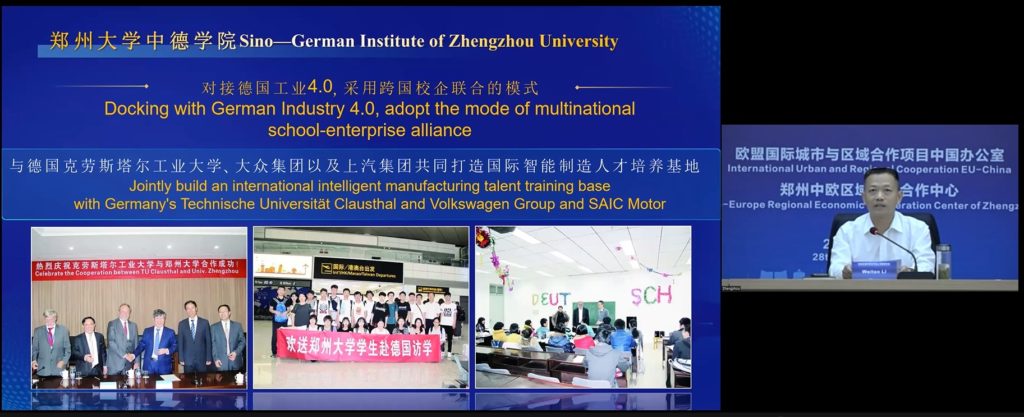 Zhengzhou (China) shared the city´s strategy of innovation-driven development, scientific education and talent cultivation, highlighting the EU-China cooperation in industry 4.0 and organic agriculture.
Zhengzhou (China) shared the city´s strategy of innovation-driven development, scientific education and talent cultivation, highlighting the EU-China cooperation in industry 4.0 and organic agriculture.
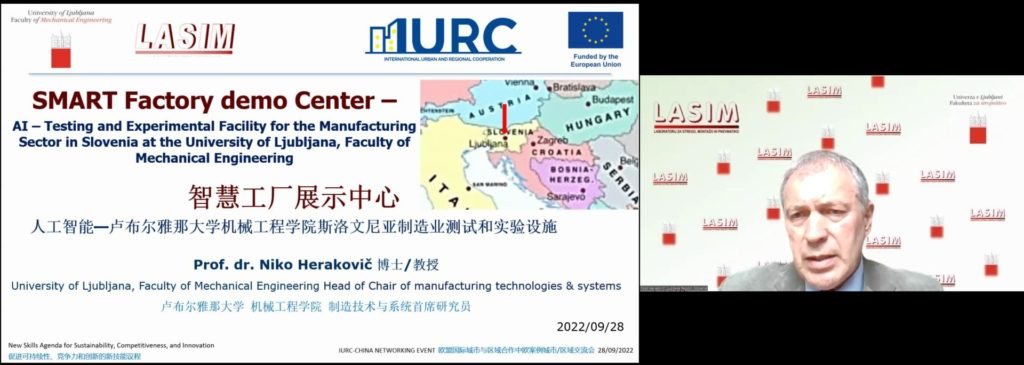 Ljubljana urban region (Slovenia) shared the best practice of a smart factory demo centre at the University of Ljubljana’s Faculty of Mechanical Engineering. The goal is to demonstrate the innovative use and implementation of Industry 4.0 technologies and the smart factory concept in an actual industrial environment. The university proposed cooperation in key areas such as AI and smart algorithms, robotic and cobotic cells, and smart manufacturing.
Ljubljana urban region (Slovenia) shared the best practice of a smart factory demo centre at the University of Ljubljana’s Faculty of Mechanical Engineering. The goal is to demonstrate the innovative use and implementation of Industry 4.0 technologies and the smart factory concept in an actual industrial environment. The university proposed cooperation in key areas such as AI and smart algorithms, robotic and cobotic cells, and smart manufacturing.
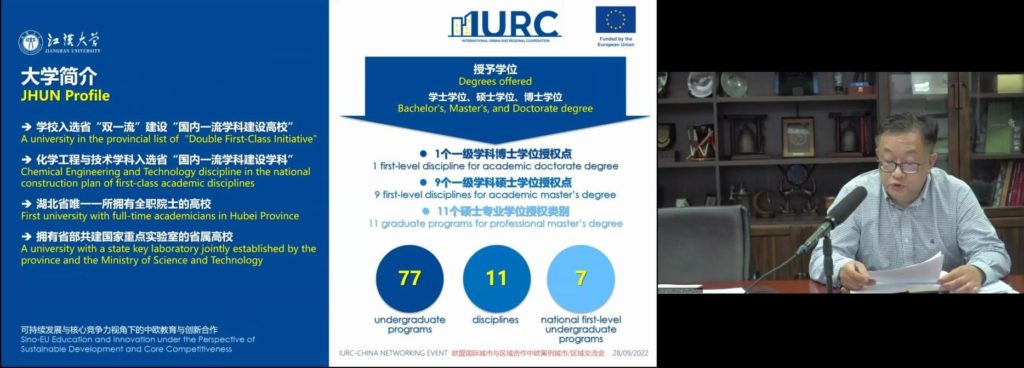 Wuhan (China) shared the research and development at Jianghan University, proposing academic cooperation and the exchange of students and teachers.
Wuhan (China) shared the research and development at Jianghan University, proposing academic cooperation and the exchange of students and teachers.
Q&A
IURC cluster managers Floriske Deutman and GUO Yuanlai facilitated the discussion session, aiming to faciliate the participating cities and regions to explore the potential cooperation areas, for example, Sofia – Hangzhou in digital innovation, Ljubljana urban region – Wuhan in smart factory lab, and Lazio region – Zhengzhou in urban agriculture.
Closing Session
Qian WANG, team leader of IURC-China reviewed the interesting points from the webinar and envisioned the future steps.
During the webinar, the cities and regions exchanged different strategies employed to enhance the capacity of the local education and training providers, and how these incentive plans align with long-term objectives to boost the green, digital and low-carbon economy. It was a very insightful working session for all participants who shared their experiences. They will further exchange their perspectives and foster deeper cooperation partnerships.
The webinar was moderated by Keru FENG from IURC-China team.
